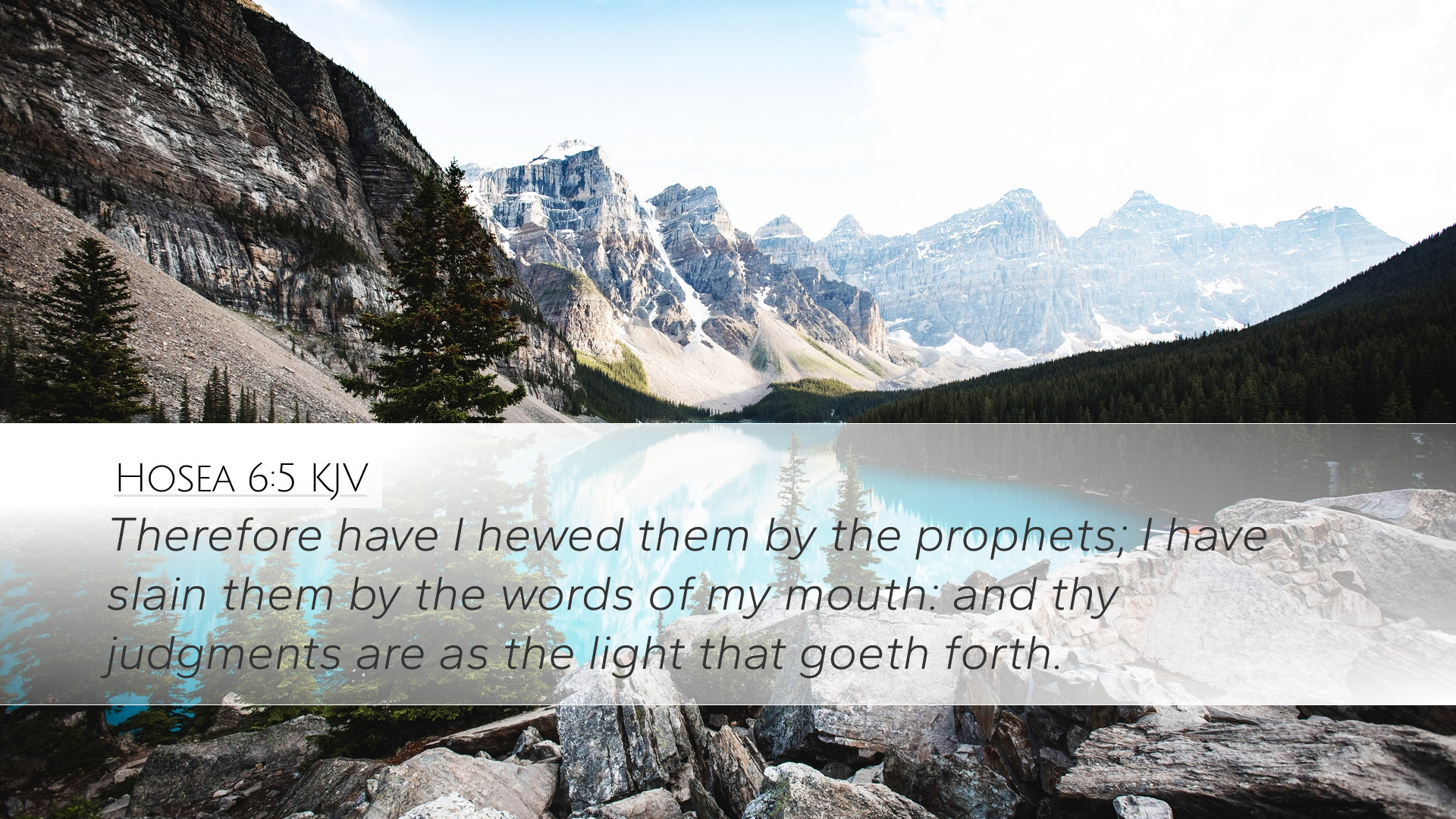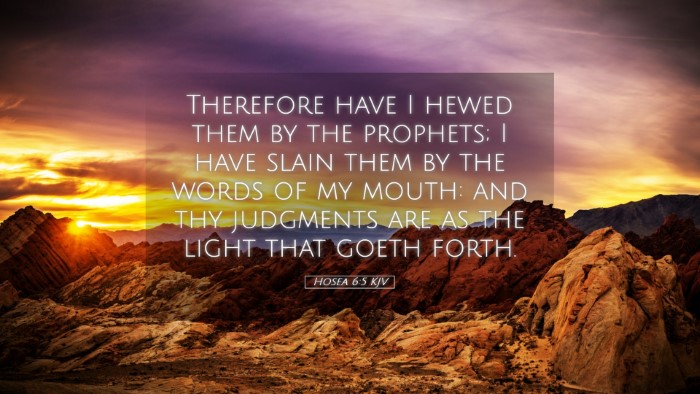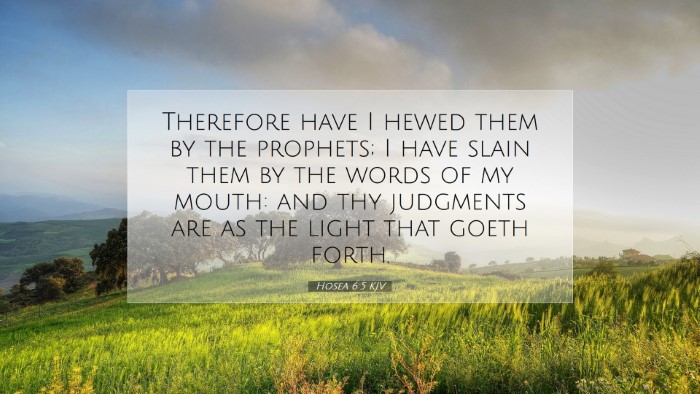Old Testament
Genesis Exodus Leviticus Numbers Deuteronomy Joshua Judges Ruth 1 Samuel 2 Samuel 1 Kings 2 Kings 1 Chronicles 2 Chronicles Ezra Nehemiah Esther Job Psalms Proverbs Ecclesiastes Song of Solomon Isaiah Jeremiah Lamentations Ezekiel Daniel Hosea Joel Amos Obadiah Jonah Micah Nahum Habakkuk Zephaniah Haggai Zechariah MalachiHosea 6:5
Hosea 6:5 KJV
Therefore have I hewed them by the prophets; I have slain them by the words of my mouth: and thy judgments are as the light that goeth forth.
Hosea 6:5 Bible Commentary
Commentary on Hosea 6:5
Verse: Hosea 6:5 - "Therefore have I hewed them by the prophets; I have slain them by the words of my mouth: and thy judgments are as the light that goeth forth."
Introduction
This verse from Hosea encapsulates the dual aspects of God's communication with His people through the prophets—both a means of correction and a declaration of His justice. It conveys the powerful role of prophetic words in bringing light to the truth and lifting the veils of ignorance that cover the hearts of men. Here, we explore the insights from esteemed commentators such as Matthew Henry, Albert Barnes, and Adam Clarke, highlighting their exegesis and theological reflections.
Main Themes
- The Role of Prophets: Hosea asserts that God has "hewed" His people through the prophets. This metaphor implies both crafting and correcting, suggesting that the work of the prophets is to shape the moral and spiritual character of the nation.
- The Power of God's Word: The reference to slaying "by the words of my mouth" underscores the transformative power of divine pronouncements. The Word of God is not merely informational; it carries the weight to challenge, convict, and fundamentally alter the path of individuals and communities.
- Judgment and Light: God's judgments are likened to "light that goeth forth." This imagery is crucial, as it portrays God's judgments not simply as punitive but as revelatory, illuminating the dark corners of sin and ignorance.
Commentary Insights
Matthew Henry's Perspective
Matthew Henry emphasizes the corrective nature of divine discourse through the prophets. He notes that God's judgments serve as a means to awaken the sinners to their state. His reflection on the phrase "hewed them by the prophets" implies that God’s intention is both to prune and to prepare them for a return to righteousness. Henry asserts that the word of God, while it may cut and wound, is ultimately aimed at healing and restoration, a crucial reminder for both pastors and believers alike.
Albert Barnes' Analysis
Albert Barnes offers a thorough examination of the active role of the prophets in conveying God’s message to Israel. He highlights that the metaphor of slaying should be understood in the context of moral and spiritual death which results from disobedience. Barnes brings forth the notion that God's words are filled with authority and judgment—these are not whimsical remarks but declarations from the Almighty, which carry eternal consequences. His articulation serves as a solemn reminder of the inherent seriousness of God's commandments.
Adam Clarke's Commentary
Adam Clarke interprets "thy judgments are as the light that goeth forth" as an affirmation of God’s willingness to reveal truth to His people. Clarke stresses that light is essential for understanding and discerning God’s will, as well as for moral clarity. He contends that this light offers guidance, but also exposes wrongdoing. Clarke's observations encourage believers to embrace the light of God’s revelations, as it provides direction and correction in a world often filled with spiritual ambiguity.
Theological Implications
Together, the insights from these commentators reveal several theological implications of Hosea 6:5:
- The Nature of Prophets: Prophets serve as instruments of God’s will, not only foretelling future events but also calling for immediate repentance and transformation.
- The Authority of Scripture: This verse affirms the authority of God’s word, reminding us that it is not to be taken lightly. Understanding its power encourages a greater reverence toward Scripture.
- God's Desire for Restoration: The imagery of hewing suggests a God who desires to refine His people through difficult lessons, ultimately for their benefit and restoration.
Practical Applications
For pastors, students, theologians, and Bible scholars, Hosea 6:5 invites reflection and action:
- Embrace Prophetic Voices: Recognize the importance of prophetic voices in contemporary contexts, seeking to understand how God may still be speaking through them.
- Value of Divine Judgments: Approach the Scriptures with a willingness to be corrected; allow God's judgments to shape your character and actions.
- Proclaim Light: As believers, there is a calling to reflect the light of God's truth in a world engulfed in darkness. Engage in acts of justice and moral clarity, showing the way to others through love and wisdom.
Conclusion
Hosea 6:5 serves as a powerful reminder of God’s engagement with humanity through the voice of the prophets. It challenges us to consider how we respond to God’s corrections and revelations in our own lives and communities. As illustrated by the works of Matthew Henry, Albert Barnes, and Adam Clarke, comprehension of God's word leads not only to clarity but also to transformation. May we heed the prophetic words that cut deep, for they are ultimately designed to heal and lead us fully into the light of God's grace.


